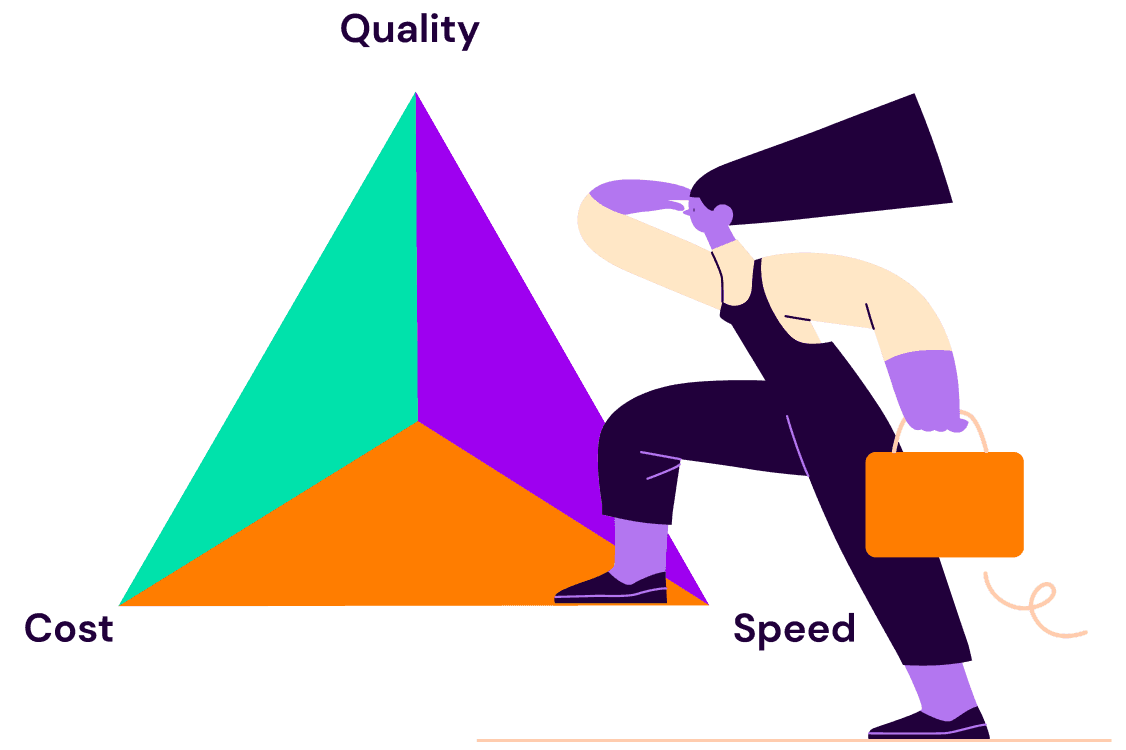
Back to blogs
t’s no secret that a veteran recruiting strategy can bring a ton of value to your business. But, if you’ve been in talent acquisition for a while, you’ll probably agree that many recruiters often overlook vets when working on tough-to-fill jobs.
Whether it’s because you don’t have the right tools to properly identify veteran candidates or maybe don’t quite understand how military experience translates to civilian careers, the truth is this: You might be spending your days digging for that purple squirrel, when the perfect veteran candidate has been sitting right under your nose all along.
In this post, I’ll show you exactly how veterans benefit your business and what you can do to jumpstart your veteran recruiting strategy today.
But first, let’s dive into the value veterans bring to your organization:
Why hire veterans?
There are plenty of reasons to implement a veteran recruiting strategy, but perhaps none quite as powerful as this one: Hiring veterans feels good.
Think about it: You’re providing opportunity to someone who risked their life to fight for our freedom and protect our rights. Who doesn’t want that?
But, it’s not just about good vibes—hiring veterans also benefits the productivity of your business as well. That’s because veterans possess skills and experience that can have a positive impact on the bottom line of your organization. Here’s how:
#1. Veterans have proven leadership experience.
Look, everyone wants to hire a leader. Even if you’re not hiring for a “leadership position,” I’m sure you want all of your employees to know how to delegate work, team up with various personalities, and inspire others toward results. And that’s precisely why including veterans in your diversity hiring strategy is such a good idea: By design, the military teaches these leadership skills. And they learn it in the most high-stress environments possible.
It explains why the majority of companies perceive veterans to have especially strong leadership skills. And also why 93% of post-9/11 veterans are interested in serving as a mentor to your other employees. It’s because soldiers in the armed services learn important leadership skills faster than in the common workforce.
As Sergeant Jon Davis, US Marines, explains it: “The military doesn’t just educate their members on the practical ways to manage behavior, such as the discipline and communication methods. Leadership is truly studied on the academic and theoretical level. More so than in other organization, this theoretical and practical leadership are put in practice as a matter of survival.”
So, in short: veterans learn how to lead for survival. And they can translate those skills to help lead toward your business goals, too. But, it’s not just their experience as leaders that should draw your attention—their ability to work as part of a team is pretty amazing, too.
#2. Veterans have top-notch teamwork and collaboration skills
In business, teamwork and collaboration often play a critical role in the success of a project. But in the armed forces, the lives of your fellow soldiers can depend on it.
And as a result, the communication skills of veterans are generally best-in-class. The ability to motivate a team and give direction is part of it. But, veterans also know how to understand complex team dynamics and drive results through clear, concise actions.
Lieutenant Colonel Stewart Welch sums it up nicely over at The Strategy Bridge: “Effective leadership hinges on conveying trust in subordinates and peers. If people understand the importance of the mission, and they know the importance of their individual contributions to the mission, then they will perform beyond expectations. Joint teams operate at the speed of trust, where the whole becomes greater than the sum of the parts.This is what the American military does better than anybody on earth, and it demands effective communication.”
The demand for great communication comes from the need to make fast, smart decisions under some serious pressure in the military. Which leads to our next reason you need a veteran recruiting strategy:
#3. Vets understand responsibility and how to deliver under pressure
Look, we’ve all been there before: you make a bad hire and all of a sudden have an employee who never seems to take their job seriously. They show up late.They’re lackadaisical when it comes to completing assignments.Their attention to detail sucks. Well, here’s the good news: Veterans are often the exact opposite.
That’s because the military instills responsibility in soldiers by forcing them to follow a strict code and adhere to policy. There’s no room for slacking off—and veterans bring that same focus and responsibility to their jobs after their service has ended. It’s the reason why 20% of veterans in the workforce are director level or above: their skills and experience help them accelerate into leadership.
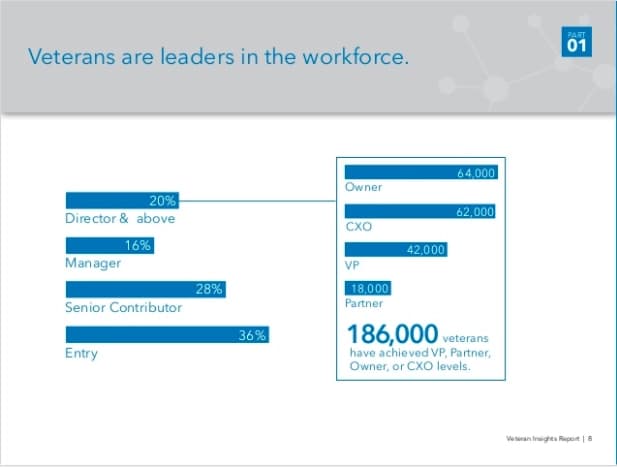
So, hiring a veteran today means hiring a leader for tomorrow. And not just any leader—a leader with a deep understanding of how the world works:
#4. Veterans offer a unique global perspective
It’s a simple fact: whether a veteran was a combat soldier, engineer, or in operations, they were all taught the same thing: achieve the goal above all else. That means overlooking differences and working alongside team members of a different race, religion, gender, or ethnicity in the name of completing the mission.
The task at hand is the one and only priority and veterans understand that in order to accomplish their goal, they need to work together as one. And it’s precisely that global point-of-view that makes veterans so conducive to an increasingly diverse workforce: their mission-first attitude means they look at the skills and experience people bring to the team before their race, gender, or any other differences.
Convinced that veterans can add tremendous value to your organization? Wondering why you haven’t been hiring them all along? Well then, read on.
Here’s why you’re missing out on veteran hires
Sure, there are already plenty of companies making a big push to hire veteran talent across the U.S., but here’s the good news. If you don’t have a veteran recruiting strategy yet, it’s not too late to start. But to get there, you need to first understand some of the reasons why you’re missing out now:
#1. You’re not sure where veterans fit or which questions to ask
Remember when you started recruiting and first learned how to interview candidates? You probably had a specific set of questions you learned to help you identify whether a candidate has the right skills for the job. Well, guess what?
It’s no different with veteran hiring. But, you do need to learn a different set of questions. Think about it: instead of asking job or task-specific questions, it makes sense for you to ask questions about a veteran’s background that draw out their experiences, and then spend time analyzing how those experiences might add value to your work environment.
Try these questions to get you started:
How would you describe your military roles in civilian terms?
Looking at your recent military work experiences: what key knowledge, skills, abilities, and experiences would you say are most valuable?
What was your primary mission and what did it take to accomplish it?
Give an example of a time something didn’t go as planned and what you did/learned from the experience
(Need a few more? Here are some additional questions.)
You might also try checking out the amazing skills translator from Military.com to find out how a veteran’s skills match up with a job within your organization.
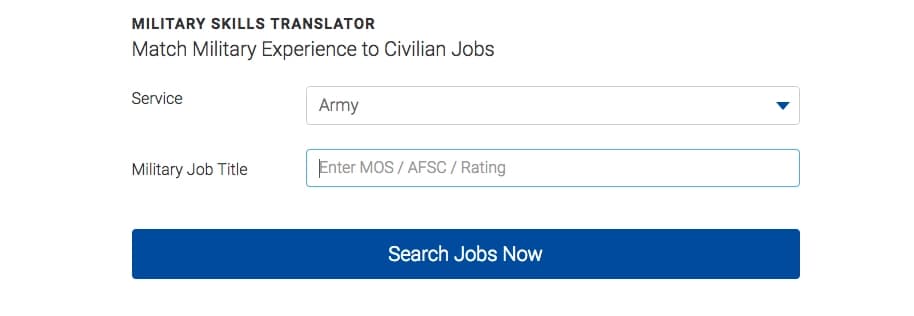
And it’s not just the hard skills you should be looking for, but the soft skills veterans have developed, too:
#2. You’re focused too much on hard skills (instead of paying attention to a veteran’s valuable soft skills)
If you read our previous blog post, you know there’s a big difference between a traditional recruiter and a true strategic talent advisor. And one of those differences is that a talent advisor takes time to sit with their hiring manager to understand the “must-have” skills versus the skills that can be taught to the right candidate.
Those conversations become even more important when it comes to a veteran recruiting strategy. Many vets may not have the “hard skills” that qualify them for an open position at your company. But that doesn’t mean they can’t learn them.
Part of a successful veteran hiring strategy is understanding that if a skill can be taught, it’s worth investing the time in training and developing veterans with big potential. This is especially true considering that the military pays for education, so veterans have the resources available to learn any of the necessary skills.
#3. You don’t have the tools to efficiently uncover veteran talent
Of course, in order to hire veterans, you actually need to find them first. Sure, you could go through the laborious task of writing out long, military-focused Boolean strings to identify service members.
But frankly, it’s too time consuming. And now that SeekOut allows you to identify military veterans from over 100 million U.S. profiles with just the click of a button, it’s unnecessary, too. Take a look:
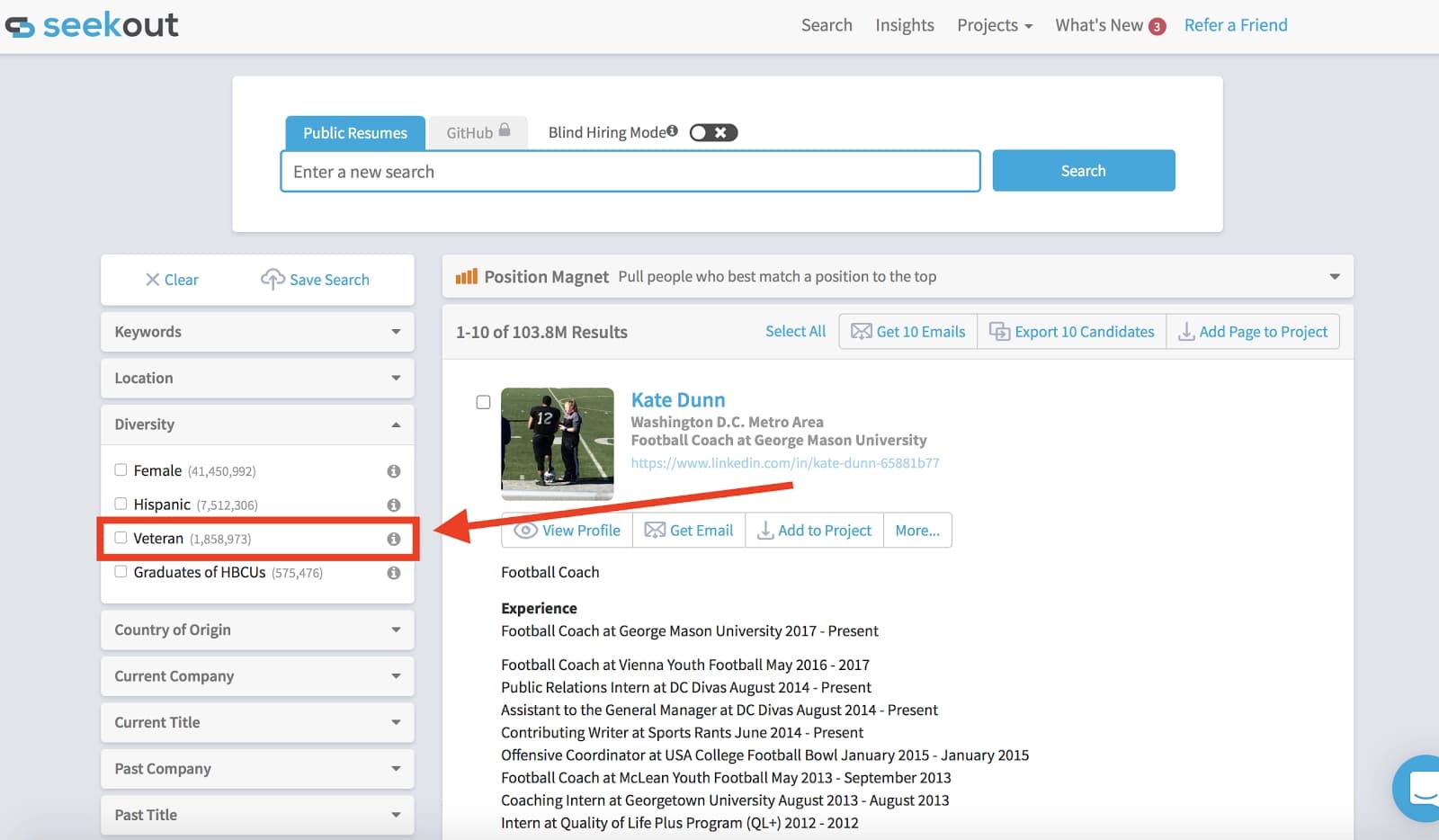
So now, with the tools and skills in place to build a successful veteran recruiting strategy, there’s really only one other hurdle to overcome:
#4. Your company needs to prioritize a veteran recruiting strategy
If you know your company doesn’t already have a game plan for recruiting veterans, take it upon yourself as a talent advisor to speak to your leadership team about making veteran hiring an initiative. And then, with leadership approval, promote your company as one that welcomes veteran talent. Why? Because your biggest problem might be perception.
Veterans are concerned about their own job hunt. In fact, 74% believe it would take them longer to find a job than a non-veteran with the same level of work experience. When it comes to not applying to or accepting jobs, common conceptions for veterans are:
Disappointment with salary or benefits
Doubting their own education or relatable experience
Selling themselves in an interview
Discrimination
Negative reviews about the company
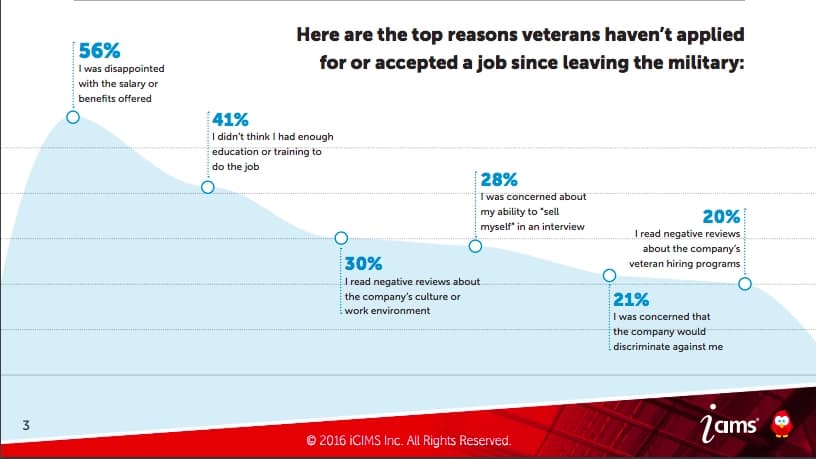
So, the more you can advertise that your company welcomes veteran talent, the more likely they will be drawn to your organization. Your brand matters. Make it a point to highlight that you offer the resources, tools, and environment that will allow military veterans to thrive.
Conclusion
Veterans offer both the hard and soft skills that can drive the results your business needs. And that’s why the best thing you can do for your business right now might be to hone in on your veteran recruiting strategy.
See us in action
Learn how SeekOut unifies people data to help organizations reach their talent goals
Request a demo